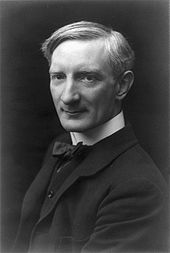History of the London School of Economics
This article needs additional citations for verification. (July 2009) |

The history of the
Foundation and early history
Supposedly the decision to found the school was made at a breakfast party on 4 August 1894. All believed in advancing socialist causes by reformist rather than revolutionary means, and the LSE was established to further the Fabian aim of bettering society, focusing on research on issues of poverty, inequality and related issues. This led the Fabians, and the LSE, to be one of the main influences on the UK Labour Party.[1]
The School was founded with the initial intention of renewing the training of Britain's political and business elite, which seemed to be faltering due to inadequate teaching and research - the number of postgraduate students was dwarfed by those in other countries. A year before the founding, the

The School expanded rapidly and was moved along with its newly established library, the

During these years and under the directorship of William Beveridge, future father of the welfare state and the National Health Service, LSE redefined the study of economics and the new conception of the study of economics as "a science which studies human behaviour as a relationship between ends and scarce means which have alternative uses" is looked to as the norm. LSE in this sense must be looked at as the father of modern economics studies. Under Beveridge, Friedrich Hayek was appointed as a professor and he brought about the ascendancy of the LSE through his famous debates with John Maynard Keynes.
In 1939, with the outbreak of the
The famed Keynes-Hayek debates which occurred between
Recent history
While the LSE's initial reputation was that of a socialist-leaning institution, this had changed by the 1960s, with LSE Director
In 2002, it was reported that the school had applied to the
Libya links
On 4 March 2011, LSE's Director Howard Davies resigned over allegations that the LSE had accepted donations from the Libyan government in return for favourable treatment.
References
- ^ A piece of Fabian history unveiled at LSE Archived 2007-02-05 at the Wayback Machine
- ISBN 978-2-7246-3915-5.
- OCLC 706023485.
- ^ Goddard, Alison (22 November 2002). "LSE plan to break rank piles on pressure". The Times Higher Education Supplement. Retrieved 25 August 2009.
- ^ Attwood, Rebecca (23 February 2007). "London trio to award their own degrees". The Times Higher Education Supplement. Retrieved 25 August 2009.
- ^ "LSE degree-awarding powers: frequently asked questions for PhD students" (Microsoft Word document). London School of Economics. August 2007. Retrieved 25 July 2009.[permanent dead link]
